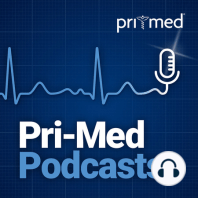10 min listen

Preventing Peanut Allergies—Are You Following the Recommendations? - Frankly Speaking Ep 306
FromPri-Med Podcasts
Preventing Peanut Allergies—Are You Following the Recommendations? - Frankly Speaking Ep 306
FromPri-Med Podcasts
ratings:
Length:
13 minutes
Released:
Dec 12, 2022
Format:
Podcast episode
Description
Credits: 0.25 AMA PRA Category 1 Credit™
CME/CE Information and Claim Credit: https://www.pri-med.com/online-education/podcast/frankly-speaking-cme-306
Overview: In 2015, a landmark study, LEAP (Learning Early About Peanut Allergy), found that early introduction to peanuts, at 4 to 6 months, significantly reduced the incidence of peanut allergies in all children but especially in those at high risk for allergies. A recent survey of pediatric residents and attendings in a large academic center regarding knowledge and implementation of the guidelines uncovered a significant knowledge gap impacting the health of children. Join us as we discuss this gap and review the guidelines for preventing peanut allergies in infants and children.
Episode resource links:
Sandhu S, Hanono M, Nagarajan S, Vastardi MA. Knowledge assessment of early peanut introduction in a New York City population [published online ahead of print, 2022 Jun 18]. Ann Allergy Asthma Immunol. 2022;S1081-1206(22)00534-8. doi:10.1016/j.anai.2022.06.013
Greer FR, Sicherer SH, Burks AW, AAP COMMITTEE ON NUTRITION, AAP SECTION ON ALLERGY AND IMMUNOLOGY. The Effects of Early Nutritional Interventions on the Development of Atopic Disease in Infants and Children: The Role of Maternal Dietary Restriction, Breastfeeding, Hydrolyzed Formulas, and Timing of Introduction of Allergenic Complementary Foods. Pediatrics. 2019;143(4): e20190281
Togias A, Cooper SF, Acebal ML, et al. Addendum guidelines for the prevention of peanut allergy in the United States: Report of the National Institute of Allergy and Infectious Diseases-sponsored expert panel. Ann Allergy Asthma Immunol. 2017;118(2):166-173.e7. doi:10.1016/j.anai.2016.10.004
Fleischer DM, Sicherer S, Greenhawt M, et al. Consensus Communication on Early Peanut Introduction and Prevention of Peanut Allergy in High-Risk Infants. Pediatr Dermatol. 2016;33(1):103-106. doi:10.1111/pde.12685
Du Toit, G., Roberts, G., Sayre, P. H., Bahnson, H. T., Radulovic, S., Santos, A. F., Brough, H. A., Phippard, D., Basting, M., Feeney, M., Turcanu, V., Sever, M. L., Gomez Lorenzo, M., Plaut, M., Lack, G., & LEAP Study Team (2015). Randomized trial of peanut consumption in infants at risk for peanut allergy. The New England journal of medicine, 372(9), 803–813. https://doi.org/10.1056/NEJMoa1414850
Koplin JJ, Soriano VX, Peters RL. Real-World LEAP Implementation. Curr Allergy Asthma Rep. 2021;22(6):61-66. doi:10.1007/s11882-022-01032-3
https://www.fda.gov/food/cfsan-constituent-updates/fda-completes-review-notification-regarding-health-claim-related-peanut-allergies
Guest: Susan Feeney, DNP, FNP
Music Credit: Richard Onorato
CME/CE Information and Claim Credit: https://www.pri-med.com/online-education/podcast/frankly-speaking-cme-306
Overview: In 2015, a landmark study, LEAP (Learning Early About Peanut Allergy), found that early introduction to peanuts, at 4 to 6 months, significantly reduced the incidence of peanut allergies in all children but especially in those at high risk for allergies. A recent survey of pediatric residents and attendings in a large academic center regarding knowledge and implementation of the guidelines uncovered a significant knowledge gap impacting the health of children. Join us as we discuss this gap and review the guidelines for preventing peanut allergies in infants and children.
Episode resource links:
Sandhu S, Hanono M, Nagarajan S, Vastardi MA. Knowledge assessment of early peanut introduction in a New York City population [published online ahead of print, 2022 Jun 18]. Ann Allergy Asthma Immunol. 2022;S1081-1206(22)00534-8. doi:10.1016/j.anai.2022.06.013
Greer FR, Sicherer SH, Burks AW, AAP COMMITTEE ON NUTRITION, AAP SECTION ON ALLERGY AND IMMUNOLOGY. The Effects of Early Nutritional Interventions on the Development of Atopic Disease in Infants and Children: The Role of Maternal Dietary Restriction, Breastfeeding, Hydrolyzed Formulas, and Timing of Introduction of Allergenic Complementary Foods. Pediatrics. 2019;143(4): e20190281
Togias A, Cooper SF, Acebal ML, et al. Addendum guidelines for the prevention of peanut allergy in the United States: Report of the National Institute of Allergy and Infectious Diseases-sponsored expert panel. Ann Allergy Asthma Immunol. 2017;118(2):166-173.e7. doi:10.1016/j.anai.2016.10.004
Fleischer DM, Sicherer S, Greenhawt M, et al. Consensus Communication on Early Peanut Introduction and Prevention of Peanut Allergy in High-Risk Infants. Pediatr Dermatol. 2016;33(1):103-106. doi:10.1111/pde.12685
Du Toit, G., Roberts, G., Sayre, P. H., Bahnson, H. T., Radulovic, S., Santos, A. F., Brough, H. A., Phippard, D., Basting, M., Feeney, M., Turcanu, V., Sever, M. L., Gomez Lorenzo, M., Plaut, M., Lack, G., & LEAP Study Team (2015). Randomized trial of peanut consumption in infants at risk for peanut allergy. The New England journal of medicine, 372(9), 803–813. https://doi.org/10.1056/NEJMoa1414850
Koplin JJ, Soriano VX, Peters RL. Real-World LEAP Implementation. Curr Allergy Asthma Rep. 2021;22(6):61-66. doi:10.1007/s11882-022-01032-3
https://www.fda.gov/food/cfsan-constituent-updates/fda-completes-review-notification-regarding-health-claim-related-peanut-allergies
Guest: Susan Feeney, DNP, FNP
Music Credit: Richard Onorato
Released:
Dec 12, 2022
Format:
Podcast episode
Titles in the series (100)
What’s Cooking With Food Allergies In Adults?- Frankly Speaking EP 111: Credits: 0.25 AMA PRA Category 1 Credits™ Claim CME/CE credit: https://www.pri-med.com/online-education/podcast/frankly-speaking-cme-111-allergies Overview: Many adults report having food allergies. However, many of those who have a food allergy have not... by Pri-Med Podcasts